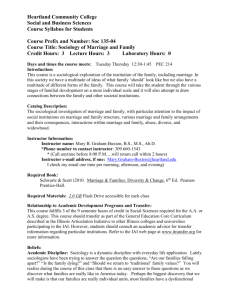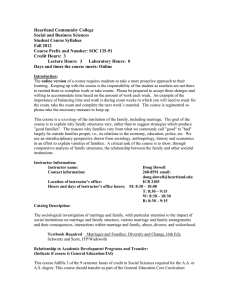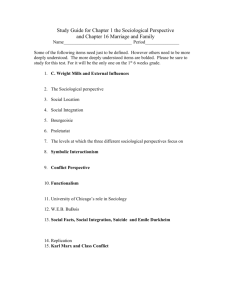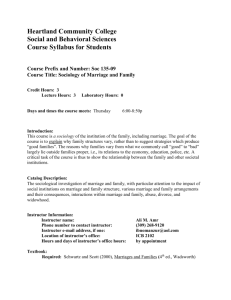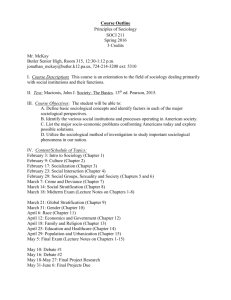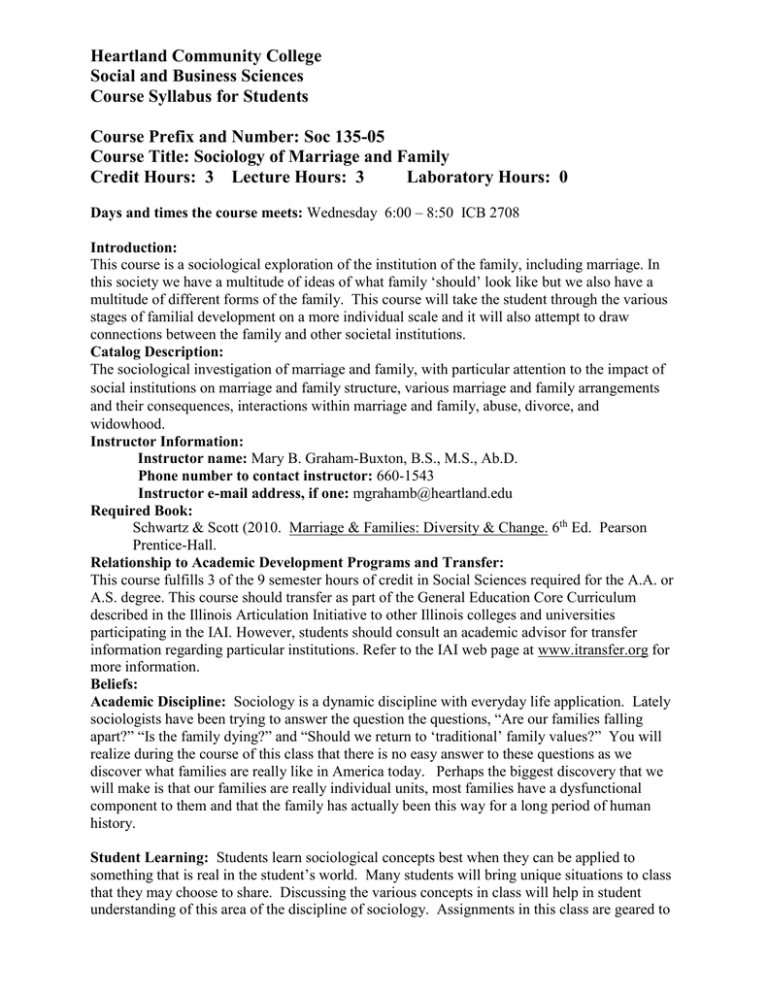
Heartland Community College
Social and Business Sciences
Course Syllabus for Students
Course Prefix and Number: Soc 135-05
Course Title: Sociology of Marriage and Family
Credit Hours: 3 Lecture Hours: 3
Laboratory Hours: 0
Days and times the course meets: Wednesday 6:00 – 8:50 ICB 2708
Introduction:
This course is a sociological exploration of the institution of the family, including marriage. In
this society we have a multitude of ideas of what family ‘should’ look like but we also have a
multitude of different forms of the family. This course will take the student through the various
stages of familial development on a more individual scale and it will also attempt to draw
connections between the family and other societal institutions.
Catalog Description:
The sociological investigation of marriage and family, with particular attention to the impact of
social institutions on marriage and family structure, various marriage and family arrangements
and their consequences, interactions within marriage and family, abuse, divorce, and
widowhood.
Instructor Information:
Instructor name: Mary B. Graham-Buxton, B.S., M.S., Ab.D.
Phone number to contact instructor: 660-1543
Instructor e-mail address, if one: mgrahamb@heartland.edu
Required Book:
Schwartz & Scott (2010. Marriage & Families: Diversity & Change. 6th Ed. Pearson
Prentice-Hall.
Relationship to Academic Development Programs and Transfer:
This course fulfills 3 of the 9 semester hours of credit in Social Sciences required for the A.A. or
A.S. degree. This course should transfer as part of the General Education Core Curriculum
described in the Illinois Articulation Initiative to other Illinois colleges and universities
participating in the IAI. However, students should consult an academic advisor for transfer
information regarding particular institutions. Refer to the IAI web page at www.itransfer.org for
more information.
Beliefs:
Academic Discipline: Sociology is a dynamic discipline with everyday life application. Lately
sociologists have been trying to answer the question the questions, “Are our families falling
apart?” “Is the family dying?” and “Should we return to ‘traditional’ family values?” You will
realize during the course of this class that there is no easy answer to these questions as we
discover what families are really like in America today. Perhaps the biggest discovery that we
will make is that our families are really individual units, most families have a dysfunctional
component to them and that the family has actually been this way for a long period of human
history.
Student Learning: Students learn sociological concepts best when they can be applied to
something that is real in the student’s world. Many students will bring unique situations to class
that they may choose to share. Discussing the various concepts in class will help in student
understanding of this area of the discipline of sociology. Assignments in this class are geared to
the student’s own family to help in the application and understanding of complex theories and
concepts.
Instructor’s Role: I believe that my role in the learning process is to make sociology as
accessible for you as possible by providing students with a variety of learning opportunities.
This means making class interesting, challenging, and, hopefully, a fun learning experience for
you. You are always welcome to contact me with questions and concerns that you are having
about this course.
General Education Program and Course Learning Outcomes:
SOC 135 is a course within the General Education Program at Heartland, and as such, contains learning
outcomes that help students develop proficiency in Communication, Diversity, Problem Solving, and
Critical Thinking. Specifically, upon completion of this course students will develop an increased
proficiency in the following areas:
Communication:
1. Utilize sociological theories to help understand and explain family relationships.
Diversity:
1. Identify differences within family systems that are due to historical era, diversity (cultural, racial,
sexual) and changing gender roles.
Problem Solving:
1. Identify and analyze family issues using appropriate methods and sources in order to gain an
understanding of the cause, influence, and outcome of said issue.
Critical Thinking:
1. Identify and appraise the various issues that are problematic for marriage and family situations.
Course Specific Outcomes:
1. Demonstrate an understanding of the connection between family upbringing and influences
outside the family unit, and how these affect one’s sense of self.
2. Describe how marriage and family values are communicated and taught to new members of
society via socialization, social institutions, mass media, and culture.
3. Identify significant processes included in family life cycles.
4. Analyze the multitude of relationships that exist in various family structures or forms.
5. Explain the various ways in which family structures form, and are influenced by personal
experiences and social events.
Course Outline:
1. Marriage and family over time
2. Ways of studying and explaining marriages and families
3. Understanding gender
4. Love
5. Dating, coupling, and mate selection
6. Sexuality and intimate relationships
7. Nonmarital lifestyles
8. The marriage experience
9. Reproduction and parenting
10. Work and the family
11. Power, abuse, and violence
12. Divorce
13. Remarriage and remarried families
14. Trends and the future
Course Policies:
Method of Evaluation
Exams: There will be five exams worth 100 points each during the course of the semester (for a
total of 500 points). These exams will consist of multiple choice, matching, short answer, and essay
questions. Each exam will have a take-home component that will serve as a “ticket-in” to the in-
class component of the exam. In order to take the in-class exam you must present the completed
take-home exam within the first 15 minutes of the in-class exam.
Writing Your Own Script: In each chapter of the textbook there is a section entitled ‘Writing Your
Own Script’. In this section students are asked to think about and reflect upon their own familial
experiences. Every week we have a chapter from the textbook as assigned reading, students will
record their own reflections in an ongoing word document as an attempt to answer and critically think
about the issues/questions raised in this section of the chapter. PRINT a copy of this ongoing journal
and turn it in on each exam day. Your journal will be accessible to you and the instructor. Each
chapter entry will be worth a possible 10 points for a total of 150 points.
Unannounced In-Class Group Projects: There will be five (5) unannounced in-class group
projects. Each project is worth 50 points. In order to participate you must be present within the first
15 minutes of project. The only thing you have to do for these projects is to be present within the
first 15 minutes, and, to be current with the readings.
Participation/Attendance:
1. You are responsible for the material presented or discussed in class even if you are
absent. The instructor will not provide notes for students who have missed class.
2. Students are expected to attend all classes and participate meaningfully in the activities
each class day. Attendance will be taken each class period.
Incompletes: Incomplete grades may be discussed with the professor. They are issued on a
case by case basis.
Extra Credit: None.
Make-up of tests and assignments: There are no make ups for late assignments or missed class
work.
Grading Scale:
There are 900 point opportunities (500 exam points; 150 Script points; and 250 In-class
unannounced group project points) available in this course.
However, you will be graded on 720 points.
90% of 720 = A
80% of 720 = B
70% of 720 = C
60% of 720 = D
below
=F
Student Conduct/Class Rules:
Student Conduct/Class Rules:
ALL ELECTRONIC EQUIPMENT WILL BE TURNED OFF AND PUT
AWAY DURING CLASSTIME. THIS INCLUDES CELL PHONES, MP3
PLAYERS AND PAGERS. TURN OFF AND PUT AWAY ALL
ELECTRONIC EQUIPMENT BEFORE CLASS STARTS. . TEXTING
ABOVE THE DESKTOP OR UNDER THE DESKTOP WILL BE
PROHIBITED. THERE WILL BE ONLY ONE (1) WARNING AND THE
STUDENT WILL BE EXCUSED FROM THE CLASS.
1. Do not interrupt other students while they are making a point or asking a question.
2. Do not attempt to carry on a conversation with another student while in class. Idle
chit chat is disruptive to the instructor and other students in the class. If this behavior
occurs, the students engaged in talking may be asked to leave the class.
3. Athletes who must have the instructor fill out grade forms for them during the
semester, MUST approach instructor at the end of class.
4. Any behavior that is disruptive to the class will be subject to disciplinary actions.
Failure to follow the class rules will result in disciplinary action. After a first warning,
students will simply be told to leave the class. If this occurs more than once the student will
be withdrawn from the course.
ACADEMIC INTEGRITY AND PLAGIARISM:
Academic Integrity
Academic integrity is a fundamental principle of collegial life at Heartland Community College
and is essential to the credibility of the College’s educational programs. Moreover, because
grading may be competitive, students who misrepresent their academic work violate the right of
their fellow students. The College, therefore, views any act of academic dishonesty as a serious
offense requiring disciplinary measures, including course failure, suspension, and even expulsion
from the College. In addition, an act of academic dishonesty may have unforeseen effects far
beyond any officially imposed penalties.
Violations of academic integrity include, but are not limited to, cheating, aiding or suborning
cheating or other acts of academic dishonesty, plagiarism, misrepresentation of data, falsification
of academic records or documents and unauthorized access to computerized academic or
administrative records or systems. Definitions of these violations may be found in the College
catalog.
Plagiarism
Plagiarism is the presenting of others’ ideas as if they were your own. When you write a paper,
create a project, do a presentation or create anything original, it is assumed that all of the work,
except for that which is attributed to another author or creator, is your own. Plagiarism is
considered a serious academic offense and may take the following forms:
• Copying word-for-word from another source and not giving that source credit.
• Paraphrasing the work of another and not giving that source credit.
• Adopting a particularly apt phrase as your own.
• Using an image or a copy of an image without crediting its source.
• Paraphrasing someone else’s line of thinking in the development of a topic as if it were your
own.
• Receiving excessive help from a friend or elsewhere, or using another project as if it were your
own.
[Adapted from the Modern Language Association’s MLA Handbook for Writers of Research
Papers. New York: MLA, 1995: 26]
Note that word-for-word copying is not the only form of plagiarism. The penalties for plagiarism
may be severe, ranging from failure on the particular piece of work, failure in the course or
expulsion from the school in extreme cases.
FERPA: Family Educational Rights and Privacy Act (PL93-380) allows students to suppress
certain information. See page 189 in your student handbook for further description of this act.
For this class ALL communication between you and the professor MUST occur one of two ways.
They are: 1) Heartland email, or, 2) face to face. If you have given your password to family
members or friends, my advice is to change it if you want the guarantee of privacy. I will
communicate with you via Heartland email only with the assumption it IS you and no one else.
The responsibility for this assumption being met is yours.
SOC 135 SEC 05 MONDAY/WEDNESDAY 6:00 – 8:50 ICB2708
Week Of
Topic
Readings
1 - Aug 22
Introduction
Syllabus
2 - Aug 29
Families throughout Time
Chapter 1
3 - Sep
Ways of Studying M&F
Chapter 2
Chapter 3
7
4
Sep 12
Understanding Gender
5
Sep 21
21
EXAM ONE Chapters 1,2,3
Love
Chapter 4
6
Sep 26
Dating & Mate Selection
Chapter 5
7
Oct
Sexuality
Chapter 6
8
Oct 12
12
Nonmarital
Chapter 7
EXAM TWO Chapters 4,5,6
9
Oct 17
The Marriage Experience
Chapter 8
10
Oct 24
Reproduction/ Parenting
Chapter 9
11
Nov 2
EXAM THREE Chapters 7,8,9
Work & the Family
Chapter 10
12
Nov 7
Power, Abuse & Violence
Chapter 11
13
Nov 14
Divorce
Remarriage
Chapter 12
Chapter 13
3
14
Happy Turkey Day
15
30
EXAM FOUR Chapters 10,11,12
Marriage in Later Life
Chapter 14
16
Dec 5
Future Marriage and Family Chapter 15
17 DEC 12
EXAM FIVE Chapters 13,14,15
FINAL EXAM WEEK

